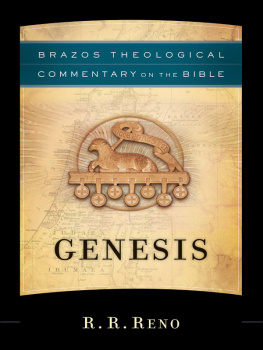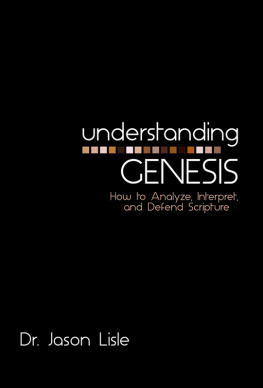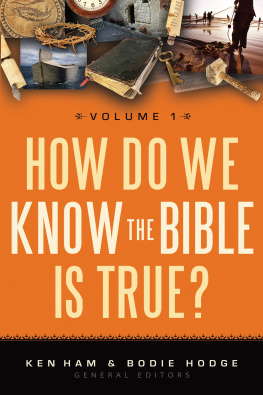First printing: October 2008
Sixth printing: January 2012
Copyright 2008 by Master Books. All rights reserved. No part of this book may be used or reproduced in any manner whatsoever without written permission of the publisher, except in the case of brief quotations in articles and reviews. For information write:
Master Books, P.O. Box 726, Green Forest, AR 72638.
ISBN-13: 978-0-89051-548-8
Library of Congress Number: 2008935776
Cover by Farewell Communications
Please consider requesting that a copy of this volume be purchased by your local library system.
Printed in the United States of America
Please visit our website for other great titles:
www.masterbooks.net
For information regarding author interviews,
please contact the publicity department at (870) 438-5288.

Contents
Foreword
Dr. Henry M. Morris
A volume such as this is long overdue and very much needed in the world of evangelical theology. And it is singularly appropriate that it be dedicated to my long-time friend and associate, Dr. John Whitcomb. I consider it a privilege to write a foreword endorsing the book and encouraging Christians everywhere to read it and use it in their own ministries and witness for the Lord. It is especially recommended that evangelical pastors and Bible professors in seminaries and Bible colleges carefully consider its evidences and arguments. Compromise on issues related to creation and primeval history has been much too common among Christian leaders. John Whitcomb, for nearly 50 years, has seemed almost like a voice crying in the wilderness, seeking to call his theological brethren back to the clear biblical teachings on these great themes. But now they are coming back, and the authors of the chapters in this book give good reasons why.
It has long seemed anomalous to me, as a professional scientist and non-professional Bible reader, that the modern revival of literal biblical creationism (the term I prefer to young-earth creationism) has been led mostly by scientists rather than theologians. The book The Genesis Flood published in 1961, for example, contained more scientific discussion than biblical. The Creation Research Society was formed in 1963 as an organization of creationist scientists, and there has been a great proliferation of creationist organizations and ministries since that time; these have all been mainly staffed by scientists. Many other books on creation-science have followed, again written mostly by scientists.
It is true that there are many good scientific evidences pointing to special creation, a young earth, and the global Flood, and these have been persuasively advanced by creationist scientists in debates, seminars, and conferences for many years and with great results. But the compelling and definitive evidences are biblical, not scientific. Science and the scientific method do support creation, but can never either prove creation or disprove evolution. Nor can it determine the age of the earth or prove that there was a worldwide deluge in the prehistoric past.
The Bible is explicitly clear on these issues, however. There is not even a hint of evolution or the long ages implied by evolution in the Bible. Neither is there any biblical intimation that the Genesis Flood was a local Flood or a tranquil Flood, as theological theories that compromise with evolution would require. One does not have to be a theologian or Bible scholar to see this. It becomes quite evident to anyone who simply reads the Bible and believes it to be the inerrant Word of God.
But why dont most theologians see this? Especially evangelical theologians and pastors trained in evangelical seminaries? That has been the anomaly. They all profess to believe the Bible as the inspired Word of God, and that is clearly what the Bible records.
Yet for a long time even orthodox, conservative, evangelical seminaries have been teaching their students to accommodate evolution or at least the long ages of evolution in their worldviews. They have used the gap theory or the day/age theory or even the highly ambiguous framework theory to try to do this.
But these dont work biblically and are unnecessary scientifically. I realize that the underlying motive in these compromise views has been to defend the gospel and win people to Christ in spite of the predominance of secularism in our society. But they certainly are not necessary. Seminaries do not usually include much science in their curricula, but the general feeling has been that since science has proved evolution and the geological ages to have occurred, these concepts must be incorporated somehow in our theologies, no matter how much we have to distort or spiritualize Genesis to do so.
I realize that the scientific establishment is still strongly committed to evolutionism, even though there are now literally thousands of what they call young-earth creationists who are fully credentialed scientists. The leading scientific journals and even most newspapers refuse to publish creationist articles and the scientific societies are all dominated by evolutionists. Their leaders vigorously oppose including creationism (or even the mention of any anti-evolution evidences) in the public schools. They repeat the mantra, Creation is religion, evolution is science over and over whenever the question comes up.
All this seems to intimidate most theologians to such an extent that true literal biblical creationism has long been taught almost as rarely in Christian seminaries as it has in state universities.
But evangelical theology ought to be governed by the Word of God rather than the pronouncements of scientists. That is why this volume is so timely and so necessary. The authors of these chapters are fully qualified to write on this subject from a biblical and theological perspective, and they have shown unequivocally that Gods Word teaches special creation, a young earth, a worldwide Flood, and the God-centered worldview in general. For all who really believe in biblical inerrancy and perspicuity, these studies should settle the matter once and for all.
They wont do so, however, for secular evolutionists. The evolutionary worldview will almost certainly continue to dominate the world as a whole; in fact, biblical prophecy would indicate that this will be the case. But that does not justify evangelical compromise. We should let God be true, but every man a liar if it comes to that (Rom. 3:4; KJV). It is His Word that will govern at the judgment seat of Christ, not that of science.
As a matter of fact, there is no real scientific evidence for evolution anyhow. This has been amply demonstrated in the writings of many creationist scientists. No one has ever observed any genuine evolution taking place (macro-evolution, that is) in the thousands of years of recorded history so it is certainly not a part of observational science (and real science should involve observation and repetition).
Furthermore, despite certain disputable claims, no one has ever demonstrated an authentic evolutionary transitional series among all the billions of fossils preserved in the sedimentary rocks of the earths crust. So evolution did not occur in the past either, as far as the evidence shows.
In fact, evolution on any significant scale seems impossible scientifically. The law of entropy expresses the universal principle of decrease in organized complexity certainly not molecules-to-man increase in complexity!
These truths are abundantly documented in the books and articles of many qualified scientists who are creationists. Theologians who think otherwise have not really studied these writings as they should.
In reality, evolutionism is a religion not science at all. It is a belief system, attempting to explain the existence of all things without God. It might as well be called the religion of atheistic humanism, or the religion of the coming Antichrist. There is certainly no good reason for theologians or pastors or Bible teachers in general to defer to it or compromise with it any longer. Preach the word was Pauls closing admonition to young pastor Timothy (2 Tim. 4:2; KJV). The Word as it truly is, not some compromise with modern science falsely so called (1 Tim. 6:20; KJV).
Next page








